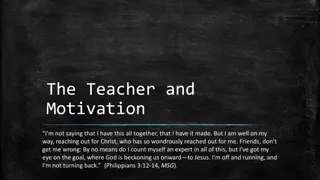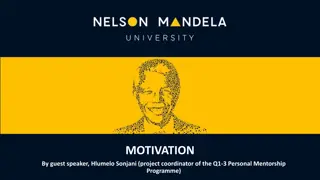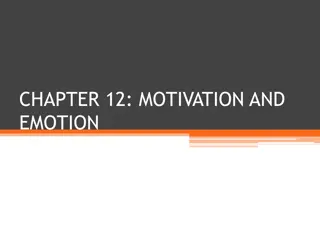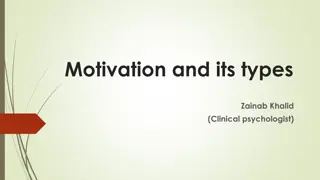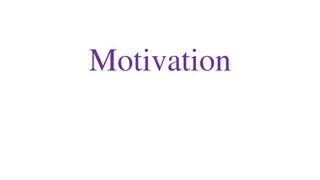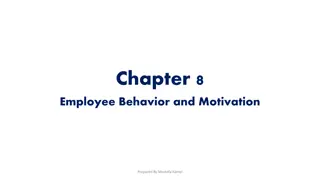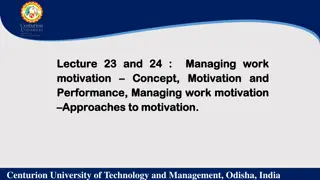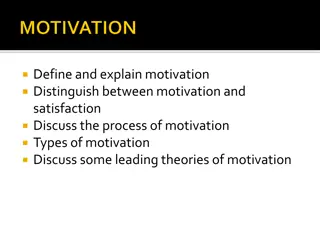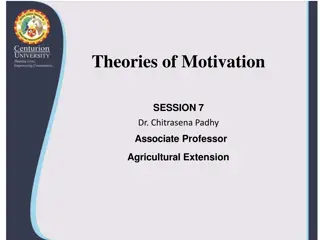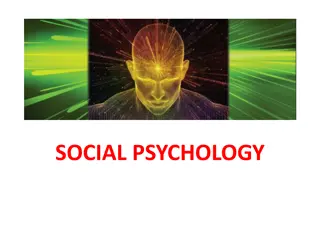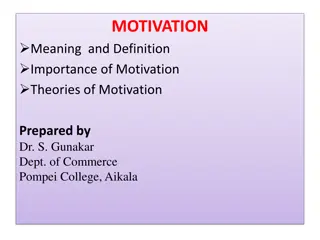Understanding Motivation Theories: Key Concepts and Implications
Motivation is crucial for inspiring individuals to achieve common goals within an organization. This presentation delves into the definition, meaning, and various theories of motivation such as Maslow's hierarchy of needs, Herzberg's motivator-hygiene theory, McGregor's X and Y theory, and Ouchi's Z theory. It explores how fulfilling different needs, such as physiological, safety, social, esteem, and self-actualization, can drive motivation and enhance productivity. The presentation also discusses the limitations and criticisms associated with motivational theories.
Download Presentation

Please find below an Image/Link to download the presentation.
The content on the website is provided AS IS for your information and personal use only. It may not be sold, licensed, or shared on other websites without obtaining consent from the author. Download presentation by click this link. If you encounter any issues during the download, it is possible that the publisher has removed the file from their server.
E N D
Presentation Transcript
UNIT-2 TOPIC- MOTIVATION (B.COM. (2NDSEM.) Presented by: Presented by: Aakansha Dahiya Assistant Professor Kanya Mahavidyalaya, Kharkhoda
DEFINITION AND MEANING OF DEFINITION AND MEANING OF MOTIVATION MOTIVATION Motivation is the process of inspiring people in order to intensify their desire and willingness for executing their duties effectively and for co- operating to achieve the common objectives of an enterprise. In other words, it means to induce, instigate, incite or prompt someone to a particular course of action for getting the results expected from him.
THEORIES OF MOTIVATION THEORIES OF MOTIVATION Maslow's hierarchy of needs Herzberg's motivator-hygiene theory McGregors X and Y theory Ouchis Z theory
MASLOW S THEORY OF MOTIVATION MASLOW S THEORY OF MOTIVATION We each have a hierarchy of needs that ranges from "lower" to "higher." As lower needs are fulfilled there is a tendency for other, higher needs to emerge. Maslow s theory maintains that a person does not feel a higher need until the needs of the current level have been satisfied.
Physiological Physiological breaks for lunch , pay salaries that allow workers to buy life's essentials. Safety Safety Needs Needs: : Provide environment which is safe, relative job security, and freedom from threats. Social Social Needs Needs: : Generate acceptance, belonging by reinforcing team dynamics. Motivation Motivation: : Provide ample a working a feeling of
Esteem Esteem achievements, assign important projects, and provide status to make employees feel valued and appreciated. Motivators Motivators: : Recognize Self Self- -Actualization Actualization: : meaningful work assignments which enable innovation, creativity, according to long-term goals. Offer challenging and and progress
LIMITATIONS AND CRITICISM LIMITATIONS AND CRITICISM Maslow s hierarchy makes sense but little evidence supports its strict hierarchy. Research has challenged the order imposed by Maslow s pyramid. As an example, in some cultures, social needs are regarded higher than any others. Little evidence suggests that people satisfy exclusively one motivating need at a time.
HERZBERG'S MOTIVATION HERZBERG'S MOTIVATION- -HYGIENE THEORY HYGIENE THEORY Frederick Herzberg performed studies to determine which factors in an employee's work environment caused satisfaction or dissatisfaction. He published his findings in the 1959 book The Motivation to Work.
APPLYING IN BUSINESS APPLYING IN BUSINESS MANAGEMENT MANAGEMENT According to Herzberg: The job should have sufficient challenge to utilize the full ability of the employee. Employees who demonstrate increasing levels of ability should be given responsibility. If a job cannot be designed to use an employee's full abilities, then the firm should consider automating the task or replacing the employee with one who has a lower level of skill. If a person cannot be fully utilized, then there will be a motivation problem increasing levels of
LIMITATION AND CRITICISM LIMITATION AND CRITICISM Critics consider Herzberg's two factor theory to be simplistic - what motivates me may be a dissatisfier for someone else. Its for individuals, not as a homogeneous group with one set of wants and needs. Some factors may be within your control, some may not.
OUCHIS OUCHIS Z THEORY Z THEORY William Ouchi developed Theory Z after making a comparative study of Japanese and American management practices. integrated model of motivation. Theory Z suggests that large complex organisations are human systems and depends on the quality of humanism used. A type Z organisation has three major features trust, subtlety and intimacy. Theory Z is an their effectiveness
THE DISTINGUISHING FEATURES OF THEORY Z THE DISTINGUISHING FEATURES OF THEORY Z ARE AS FOLLOWS: ARE AS FOLLOWS: 1. Mutual Trust 2. Strong Bond between Organisation and Employees 3. Employee Involvement 4. Integrated Organisation 5. Coordination
THEORY Z SUFFERS FROM THE FOLLOWING THEORY Z SUFFERS FROM THE FOLLOWING LIMITATIONS: LIMITATIONS: It merely provides job security and may fail to develop loyalty among employees. Participation of employees in the decision- making process is very difficult. Theory Z suggests organisation without any structure. The theory may not be applicable in different cultures.



